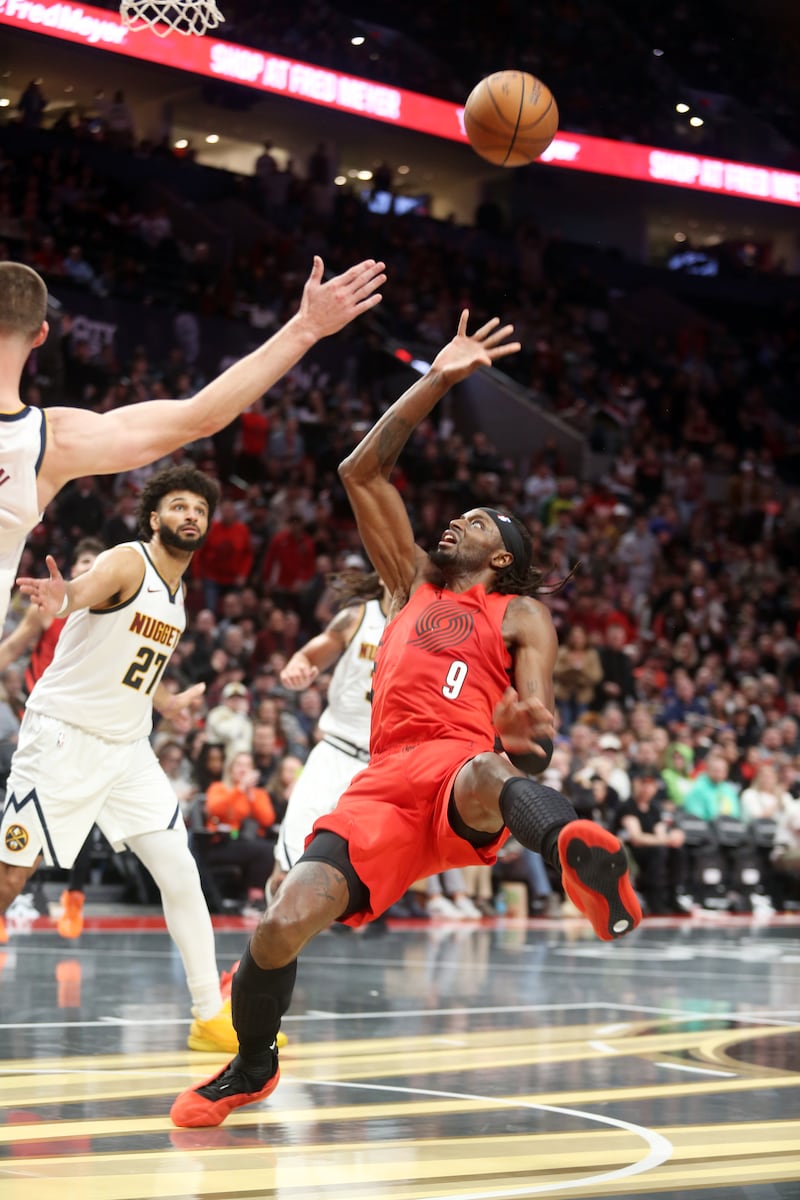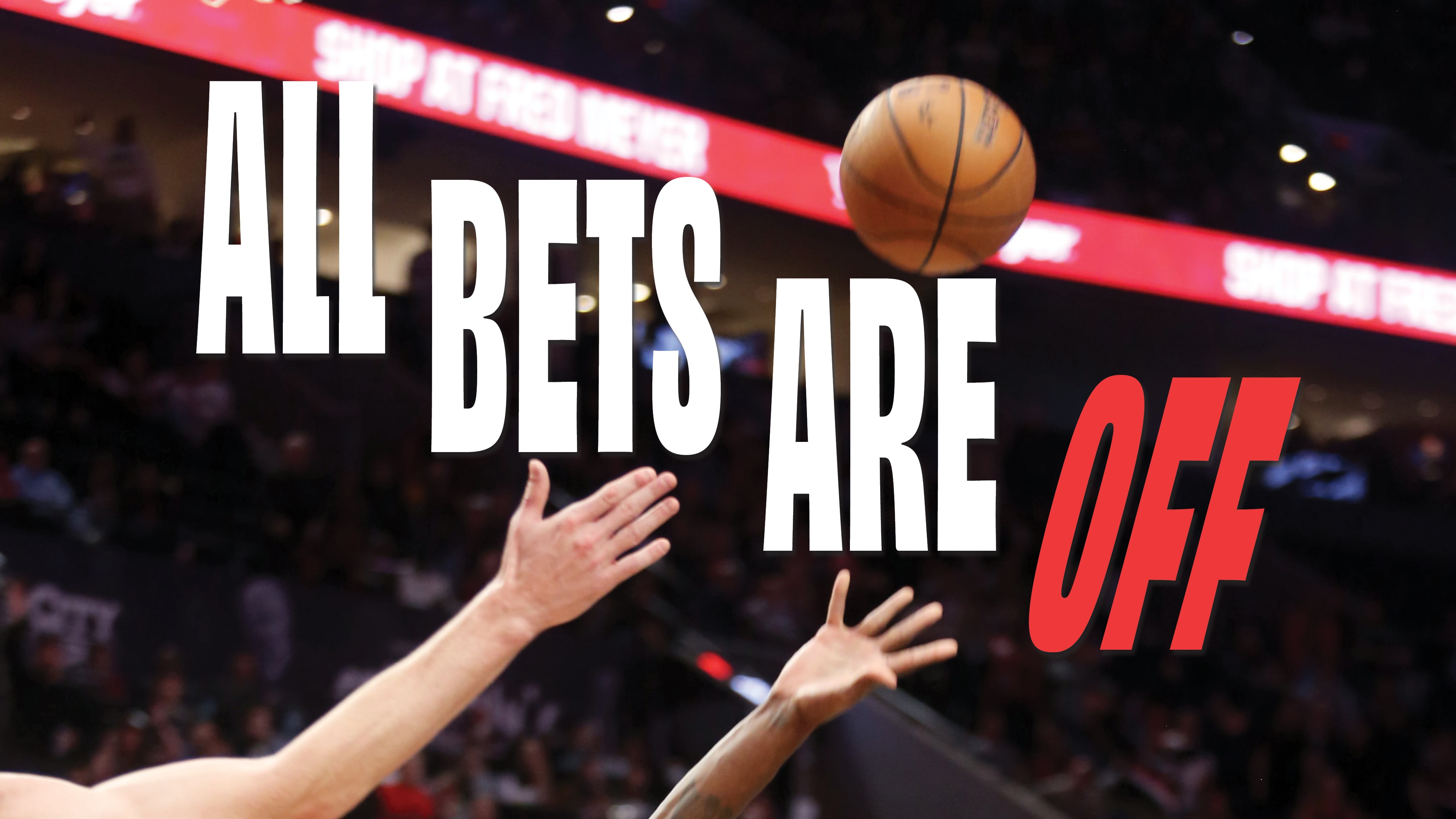It has been a very long two weeks for the Trail Blazers, whose positive vibes—finally restored during a summer full of national headlines and moves expected to vault them back into relevancy—blew away in the wind after one game.
Gone were thoughts of Damian Lillard’s prodigal return, the team’s sale to a group that had promised to keep it in Portland, and rookie center Yang Hansen and his translator doing high-level comedic bits as he acclimated to American culture.
Following a season-opening home loss to the Minnesota Timberwolves on Oct. 22, fans and Blazers players alike awoke to the story that would transcend all of that for at least the rest of this season: The team’s head coach, Chauncey Billups, had been arrested by FBI agents and was listed as the banner name in a gambling scandal perceived by some as an existential threat to the NBA.
As such, after just one game, the team’s new roster was forced to begin what is essentially an entirely new season.
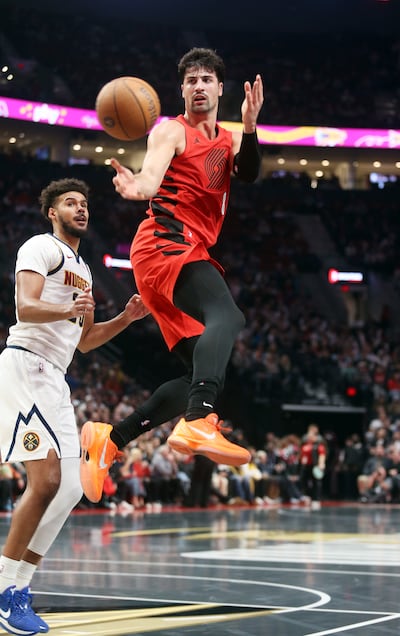
Deni Avdija, the team’s leading scorer, spoke to reporters ahead of the first game played after Billups’ arrest. “Part of the NBA is just to keep playing. We’re all here for basketball and are focused on that,” Avdija said. “It’s not an easy situation. We’re thinking about him and his family. We really love Chauncey and what he’s done with this organization.”
WW didn’t publish a Blazers season preview last month, which turns out to be just as well, given that the first 48 hours of that season followed roughly the same trajectory as the beached whale that Oregon Department of Transportation engineers once blew up with dynamite (less than a month after the Blazers played their first-ever game, for what it’s worth). Players have been left to clean up whatever chunks landed around Moda Center—and they’ve had to do it under the leadership of a new coach.
Enter Tiago Splitter, 40, a first-time NBA head coach from Brazil. His task in replacing Billups on such short notice, without a training camp or any time to help his players reset, is as daunting as any faced by a new head coach in recent memory.
Having been given a mulligan, it’s time for us to preview this second season being built out of the wreckage of the first. Here are the biggest questions the team now faces.
Why was the Blazers head coach in jail the morning after the team’s first game?
Billups, as reported Oct. 23, is charged with participating in rigged poker games run by the Mafia in which he allegedly served as a “face card,” a term used to describe conspirators who used their fame to lure starstruck participants into games they didn’t know were fixed, with some players using various pieces of sophisticated tech like glasses that could read opponents’ hands.
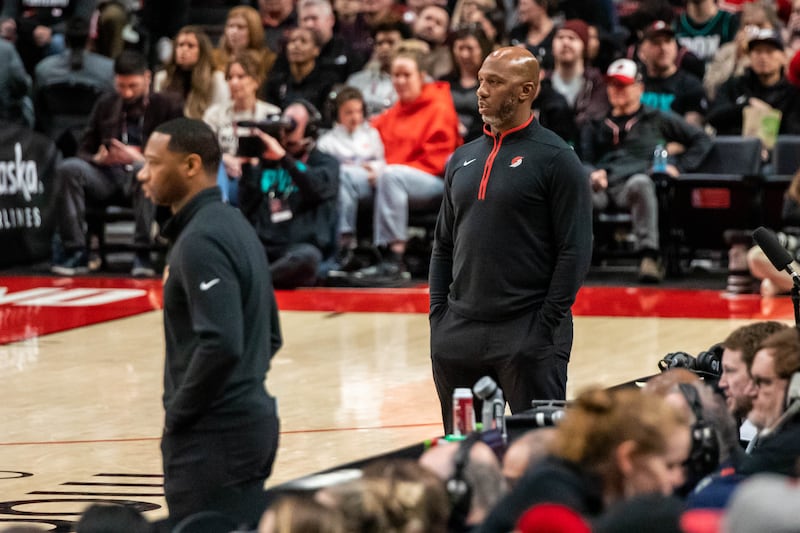
In a separate indictment, Billups is not named or charged but matches the description of the individual listed as “Co-Conspirator 8.” From the NBA’s perspective, this is a more serious matter, as Co-Conspirator 8 is alleged to have leaked nonpublic information about Lillard sitting out a late-season 2023 game against the Chicago Bulls, starting a game of telephone that eventually led to several gamblers placing big bets on the Bulls. Those wagers yielded large payouts after Chicago defeated Portland 124–96, with Lillard sitting on the bench—the place only a few people knew he would be.
Billups’ attorney Chris Heywood, who has since been replaced by a higher-profile one named Marc Mukasey, proclaimed Billups’ innocence when he appeared in federal court on Oct. 23. In a statement released to many news outlets, including WW, Heywood said:
“Anyone who knows Chauncey Billups knows he is a man of integrity; men of integrity do not cheat and defraud others. To believe that Chauncey Billups did what the federal government is accusing him of is to believe that he would risk his hall-of-fame legacy, his reputation, and his freedom. He would not jeopardize those things for anything, let alone a card game.”
Charges are not convictions, and no observer of Kash Patel’s FBI can ignore the sloppiness of its investigations. Indeed, the case against Billups has holes. But it’s also worth noting that these allegations circle back to two of the more embarrassing episodes in recent Blazers history.
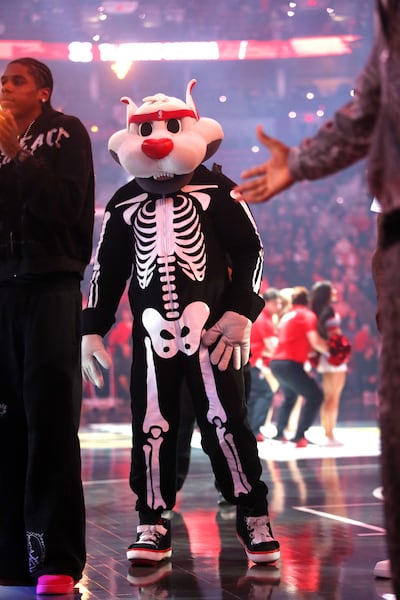
First, the poker games described in the indictments took place in 2019, two years before Portland hired Billups. When fans and press protested his hiring because of a sexual assault case that was charged but ultimately dropped against Billups early in his playing career, then-GM Neil Olshey vowed that the team had conducted an exhaustive investigation vindicating the new coach—but declined to release what they’d found. (This being the same press conference where Olshey kept sipping from a water bottle to cue his handlers to cut off further media questions.) Given that this was in 2021—again, two years after Billups was allegedly hosting illicit poker games—the rigor of the team’s due diligence seems doubly suspect.
Second, the reason Co-Conspirator 8 could tell bettors that Lillard would sit out the Bulls game was because the Blazers were doing what became a ritual for the better part of two years: tanking, or trying to lose games on purpose to secure a higher draft pick. That’s not against the gentleman’s code of the NBA, but it’s something that didn’t sit well with fans (or Lillard) even at the time, so the idea that people were cutting side deals to benefit from intentional failure carries a kind of institutional shame.
Where does all this rank in Blazer history?
Even for the Trail Blazers—who in 55 years of existence have always found innovative new ways to turn back into a pumpkin—Billups’ arrest represented a shocking reversal of fortune and a blue ribbon, the-sky-is-falling news day.
In an attempt to contextualize Billups’ arrest in the team’s broader historical record, WW reached out to five-time Oregon sports reporter of the year Dwight Jaynes, who has covered the team for various Portland publications since 1984.
“You’d probably go back to the Jail Blazers era,” Jaynes says. “There were a lot of embarrassing things that happened with the Jail Blazers, from spitting on [a fan] to getting caught with drugs to a player getting caught speeding on the Terwilliger curves and trying to use his basketball card as his ID. That kind of stuff happened quite a bit.”
But, Jaynes adds, “nothing as serious as this” has happened since he came on the scene.
Billups’ arrest (and subsequent suspension without pay by the NBA) has had a profound impact on the team’s players, who will spend the rest of this season continuing to process the charges brought against the man who had been their leader. This is a point to be underscored: Despite four losing seasons and Portland fans booing him throughout his tenure, Billups has always had a strong grip on his players and full control of his locker room. (Very few head coaches around the league could have maintained this control given the sheer amount of games the team was losing, sometimes on purpose, throughout this period.)
This stems in part from Billups’ track record from a renowned 17-year playing career and in part from his ability to communicate and find common ground with his players. Many of the team’s young players had grown up under Billups.
Given the nature of his legal situation, the players have been asked by management not to reach out to Billups, but many of them, like Avdija, have spoken up with their support for him in the media.
ESPN reported the following from Blazers guard/forward Matisse Thybulle: “‘Chauncey just believed in me,’ [Thybulle] said. And, in turn, Thybulle wants to believe in Billups now despite the accusations.”
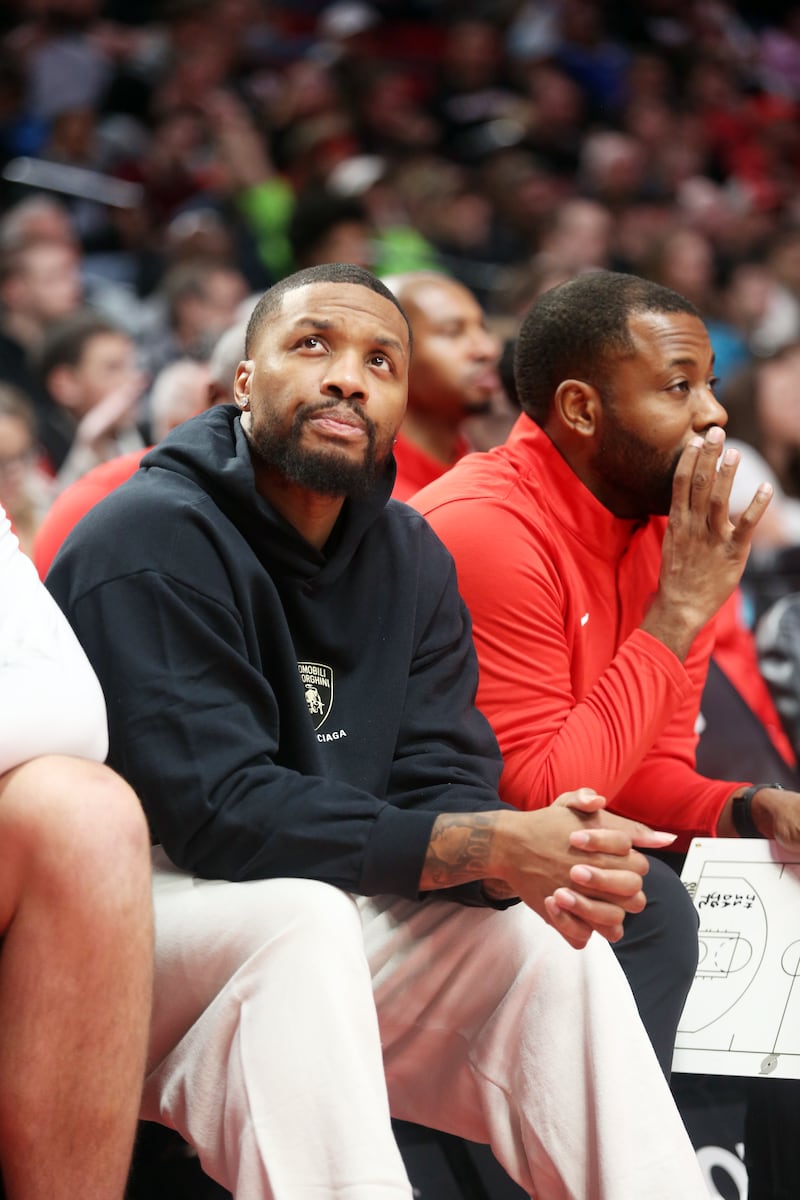
Lillard, who along with veteran guard Jrue Holiday addressed the rest of the team shortly after the news broke with a message of staying together no matter what comes next, was briefly involved in a spat with Utah Jazz power forward and Oregon native Kevin Love, who had posted a meme to Instagram poking fun at Billups and Miami Heat guard Terry Rozier, who is also currently suspended without pay by the league following the indictments.
Lillard wrote “Weak ass shit” in the comments on Love’s post. Love subsequently apologized by saying, “Spoke to Dame and he opened my eyes to this being a real-life situation for two of my former teammates and brothers.”
Now, the Billups case will wind its way through the legal system. The league will conduct its own investigation into Billups, Rozier, and the entire conspiracy. For the Blazers, the season marches on. And the man who will lead that march is Tiago Splitter.
Who is Tiago Splitter?
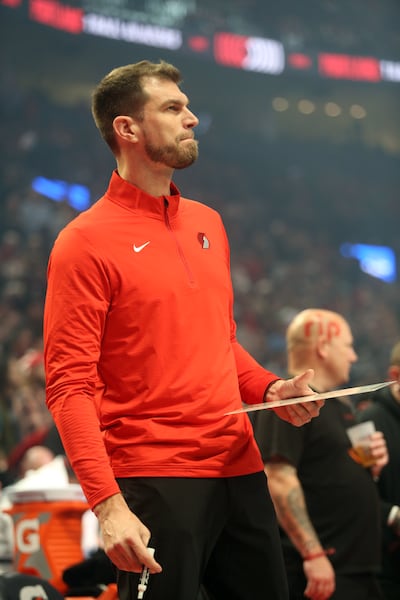
Splitter, a 6-foot-11 center, spent his early career distinguishing himself as one of the finest players in the EuroLeague before he signed with San Antonio in 2010, ultimately playing a key role on the Spurs’ 2014 title team. After retiring in 2017, he spent several seasons as an assistant coach in the NBA for the Brooklyn Nets and, more recently, the Houston Rockets.
Last season, he took over as head coach for Paris Basketball, a team founded in 2018 that took the French League by storm and ultimately won their first title under his leadership.
Jaynes has unique insight into Splitter. “My friend is part owner of the Paris franchise that he worked for last season, and I had heard this summer, before the Blazers hired him, that he was going to be a head coach in the NBA very soon, because he’s right at the forefront of the way a lot of teams want to play.”
The friend Jaynes cites is David Kahn, himself formerly a Portland sportswriter in the 1980s before going on to work in executive roles for the Indiana Pacers and Minnesota Timberwolves. Kahn is the president of Paris Basketball.
“Tiago Splitter demonstrated last season he is more than ready to be the head coach of an NBA team,” Kahn told Jaynes before this season. “He did a magnificent job last season helping us to the EuroLeague quarterfinals—in our first year of play—and the French Championship. Some of the environments we play in—the arenas in Istanbul, Belgrade and Athens—are more pressurized than any opposing NBA arena. He is smart, disciplined and passionate, and open to new ideas.”
“Portland is lucky to have him.”
(WW reached out to Paris Basketball in what was likely mangled French but didn’t receive a response.)
How has the team looked early on?
Six games into the Splitter era, early returns have been more than fans could have reasonably hoped for. The team dominated Golden State at home on Oct. 24 in Splitter’s first game as interim head coach, and is playing as though nothing had happened. The players appear to be channeling their emotions surrounding the Billups saga into competing as hard as they can on the defensive end of the floor—Billups’ specialty and his on-court legacy to the team.
Splitter is the offensive wiz, and his offense, which emphasizes speed and quick decision-making, had already been put into place over the summer, with Billups having effectively handed over that end of the floor to him.
On Halloween, the team prevailed in a spectacular game over Nikola Jokic and the Denver Nuggets in their first game of the NBA Cup, the league’s in-season tournament that culminates with the top four qualifying teams playing in Las Vegas.
After dropping a game to the Los Angeles Lakers at home on Nov. 3, the team now sits at 4–3, tied for eighth in the uber-competitive Western Conference. Their defense has been suffocating. Splitter’s offense has looked solid and should only continue to improve as the season goes on.
Donovan Clingan—promoted to the starting lineup after the departure of Deandre Ayton—has emerged as a game breaker and defensive fulcrum. Shaedon Sharpe, the team’s best hope for a breakout offensive star, has had a cold shooting start to the year after signing a four-year, $90 million extension, but has looked dialed in on defense, long his biggest critique.
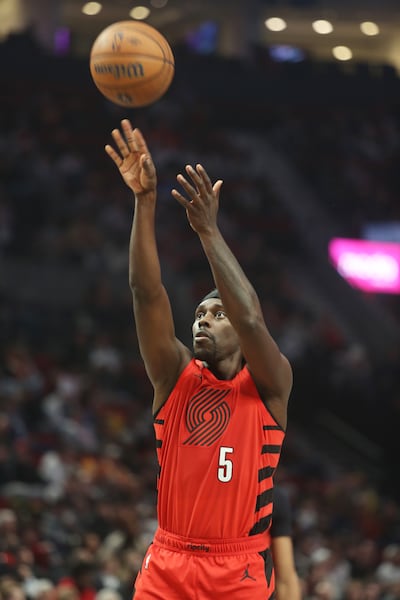
Jrue Holiday, the veteran brought in to serve as a mentor to (currently injured) prospect Scoot Henderson, has looked revitalized in his early days with the team. Holiday has been the steadying force in the team’s backcourt that the front office promised he would be when they traded longtime guard Anfernee Simons to Boston for him in the summer.
Veteran forward Jerami Grant, maligned by fans and media alike throughout last season while in the second year of a massive five-year, $160 million contract, has been a revelation, and is playing with a renewed level of fire after being passed over by Billups for the last spot in the starting lineup in favor of Sharpe.
The team’s strength lies in part with its depth, though this will be tested while two of team’s best perimeter defenders, Matisse Thybulle (thumb) and Blake Wesley (foot) sit out after suffering injuries just as backup center Robert Williams III returned to the lineup. (Rookie center Yang Hansen, the team’s first-round pick, whose rock-star status in China makes him one of the most famous players in the world, has played sparingly and was briefly sent down to the team’s G League affiliate.)
After leading his team past the Blazers on opening night, Minnesota Timberwolves superstar Anthony Edwards offered high praise for the Blazers and their defensive identity, instilled over the back end of last season and throughout this summer by Billups.
“You coming to play Portland, it ain’t no more nights off, no more gimme wins....I’m not gonna lie, I love their team,” Edwards said.
What does all this mean for the franchise’s future?
There have been no reports to indicate that the Billups situation will have any effect on the pending sale of the team to a group led by Dallas billionaire Tom Dundon by the estate of Paul Allen via his sister Jody, who has effectively been in control of the franchise since Allen’s death in 2018.
Dundon’s group was, itself, up until recently mired in a sticky legal situation. Its wealthiest investors, Andrew and Peggy Cherng, the founders of Panda Express, were being sued by longtime friends of theirs, the Bhathal family, in a Delaware court on the basis that they broke an agreement promising not to leave the Bhathals’ side in their attempt to purchase the team. (The Bhathal family owns the Portland Thorns and the expansion WNBA franchise Portland Fire through their entity RAJ Sports.) The lawsuit was withdrawn in mid-October.
Some observers are still skeptical that Dundon will keep the team in Portland without demanding a king’s ransom.
This process will play out over the next few years, and will be watched with keen interest by fans, particularly Oregon’s senior U.S. senator, Ron Wyden, who has stated he will be a “watchdog” in ensuring the team remains in Portland.
In the shorter term, Dundon is expected to assume control of the franchise next March. Presumably, he will wait until the season wraps up later in the spring to decide the fate of Blazers GM Joe Cronin, one of the key figures in the drama that has played out within the organization in the years since the death of Paul Allen.
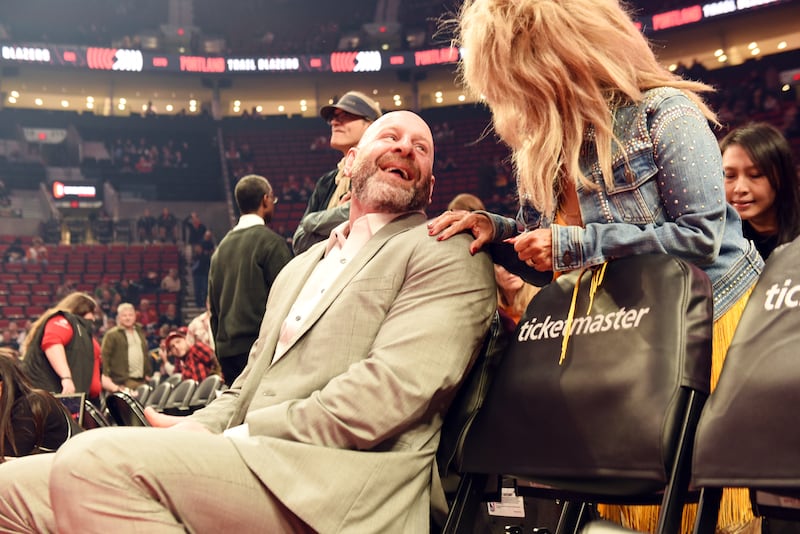
Cronin, first hired by the team as an intern in 2006, was tapped by Jody Allen to succeed his former boss Neil Olshey, who was fired by Allen in 2021 as she consolidated her power and prepared to sell the team. (Olshey, not Cronin, hired Billups earlier that year.)
In the four years since, Cronin has proven himself to be an exceptionally canny political player, navigating around both Jody Allen and Blazers vice chair Bert Kolde (Paul Allen’s college roommate), and generally getting what he wanted in his interactions with agents and opposing GMs. Today, his roster looks pretty much exactly the way he promised it would—full of grit, length, and athleticism—when he first came to power. He has Yang, whose mere presence on the roster is incalculably valuable (the team’s first preseason game drew more global viewers than Game 7 of the NBA Finals). He even has Lillard back for pennies on the dollar.
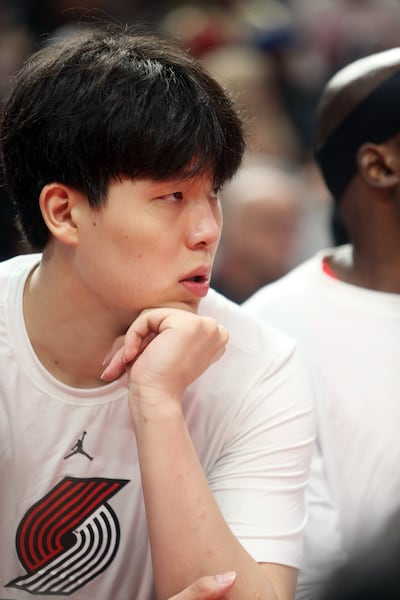
What he doesn’t have is job security. With Dundon coming on board, anything could happen. New NBA owners are notoriously prone to cleaning house. Dundon, under different circumstances, got rid of his GM a few months after taking control of his other team, the NHL’s Carolina Hurricanes.
All the while, Damian Lillard lurks in the background, unable to play for the kind of defensive-oriented roster that he waited his entire career for the team to construct for him. There is virtually no chance Lillard will return to play this season while he works to recover from the Achilles tear that he suffered last season in the playoffs while still a member of the Milwaukee Bucks.
Next season, Lillard will be 36. What sort of team and front office await him?
One way or another, the major questions the Blazers face will be answered in 2026. In the meantime, the team has a season to play. They’ll be forced once again to navigate a minefield, and try not to go the way of the whale.
